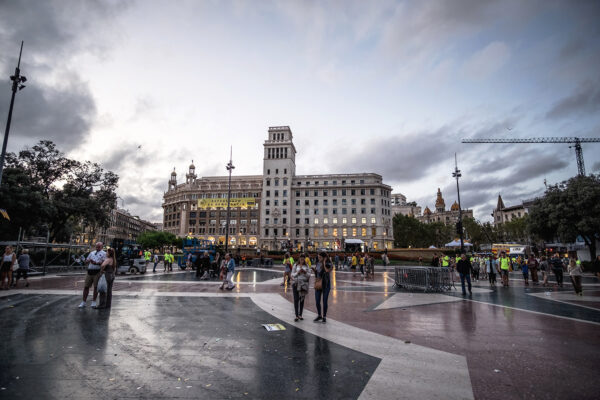
Twelve Catalans — ten politicians and two activists — went on trial this week for their role in the 2017 independence referendum and attempted secession from Spain.
There is a good chance the defendants, who include the former Catalan vice president, Oriol Junqueras — who still leads one of the region’s two largest pro-independence parties — will be found guilty of at least some of the charges against them. The Spanish Constitutional Court had, after all, forbidden the referendum in advance and the Spanish Constitution refers to the country’s “indissoluble” unity.
Hopefully the Supreme Court in Madrid (which is separate from the Constitutional Court) will throw out the more serious — and much harder to prove — accusations of rebellion and sedition, which carry prison sentences of up to 25 years.
But even light sentences would be a tragedy. This trial should never have happened. The 2017 referendum, which most opponents of independence boycotted, should never have happened. The reason it did is that the Spanish government at the time, led by the conservative People’s Party, refused dialogue with an increasingly restless nationalist movement in Catalonia.
Too little, too late
The current Spanish government, led by the social democrat Pedro Sánchez, is willing to talk about transferring more money and power to the region, which is Spain’s richest. But for many Catalans, it is too little, too late.
When the recession hit in 2008, Catalans resented being forced to cut health-care and social spending by a right-wing government in Madrid.
Adding insult to injury, the same People’s Party persuaded the Constitutional Court two years later to cancel parts of Catalonia’s autonomy statute, which had taken decades to negotiate.
Unlike the Basque Country, Catalonia was not allowed to raise its own taxes and transfer funds to Madrid. The central government takes most of Catalonia’s taxes instead and then decides how much money to send back.
Desperation
Mariano Rajoy, Sánchez’ predecessor, attempted to out-wait the Catalan problem, refusing negotiations about more autonomy or self-determination.
Desperate, more and more Catalans turned to the separatists. Whereas only a quarter wanted to break way from Spain before the economic crisis, half the voting population backed independence by 2013. Pro-independence parties took over the regional government in 2015.
Still Rajoy refused to talk. When the Catalans held their referendum in 2017, he sent in riot police, who raiding polling places and beat up voters.
Now Spanish prosecutors, in order to substantiate their charges of rebellion, allege that Catalan leaders incited this violence.
Third way
Is there still a reasonable way out?
I can’t fault Catalans who feel there is no future for them in Spain, but the practical obstacles to independence are formidable. Leaving Spain would mean leaving the European Union and NATO and Spain could block an independent Catalonia from joining both.
Consider the damage Brexit is doing to the British economy and then consider that Catalonia uses the euro and is even more dependent on European tourism and trade than the United Kingdom.
The independence issue has split Catalan society down the middle with supporters and opponents growing more intransigent.
There must be a third way.
Polls still find that when given the option of becoming a federal state inside Spain, Catalan support for independence falls to 40 percent. Catalans who are either happy with the current level of autonomy or want Spain to become a federation outnumber the separatists.
Whatever their views on independence, the overwhelming majority of Catalans want a legal referendum to decide their future.
That is close to the offer Sánchez has hinted at: a new autonomy statute, put to the Catalans in a referendum.
But nobody is listening. Hardline separatists will accept nothing less than independence. Moderates insist a referendum must be about independence, not autonomy. And the Spanish right, including the People’s Party, is rejecting any compromise, arguing that Catalonia’s autonomy must be suspended altogether.
